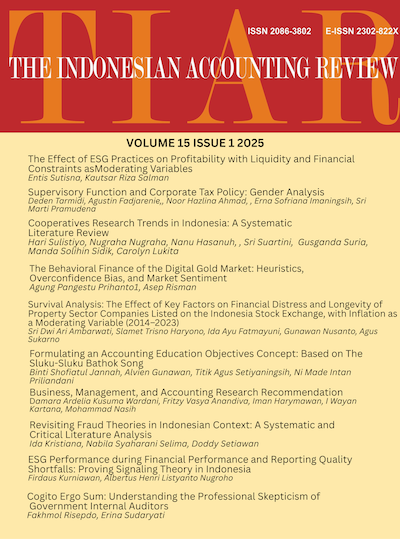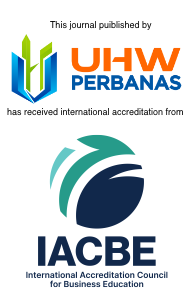The Effect of ESG Practices on Profitability Through Liquidity and Financial Constraints as Moderating Variables
DOI:
https://doi.org/10.14414/tiar.v15i1.4677Keywords:
profitability, environmental, social, governance, likuidity, financial constraintAbstract
This study aims to examine the impact of corporate involvement in activities related to the environmental, social, and governance on profitability performance. In addition, this study also examines the moderating effect of liquidity and financial constraints on the relationship between ESG practices and profitability performance. The objects of the study were 43 companies listed on the Jakarta Islamic Index 70 (JII70) and the SRI KEHATI index in the 2021-2023 period. The number of data observations was 129 data and was analyzed using Eviews software version 13. The results of the study show that corporate involvement in ESG activities has an impact on decreasing profitability performance during the study period and these results confirm the role of agency theory. The results of the study also show that financial constraints can strengthen the relationship between ESG practices and profitability performance. Conversely, liquidity cannot moderate the relationship between ESG practices and profitability performance. The theoretical implication from the perspective of agency theory is to strengthen the role of agency theory in explaining the impact of ESG on profitability in the short term. Practical implications for companies are related to the importance of the existence of activities related to ESG, although in the short term it reduces profitability, the long-term impact fosters a positive image of the company in the community.
References
Allouche, J., & Laroche, P. (2005). A Meta-analytical investigation of the relationship between corporate social and financial performance. Revue de Gestion Des Ressources Humaines, 57, 18–41.
Bae, K. H., El Ghoul, S., Gong, Z. (Jason), & Guedhami, O. (2021). Does CSR matter in times of crisis? Evidence from the COVID-19 pandemic. Journal of Corporate Finance, 67(November 2020), 101876. https://doi.org/10.1016/j.jcorpfin.2020.101876
Bai, C., Sarkis, J., & Dou, Y. (2015). Corporate sustainability development in China: review and analysis. Industrial Management & Data Systems, 115(1), 5–40. https://doi.org/10.1108/IMDS-09-2014-0258
Bansal, P., & Song, H. C. (2017). Similar but not the same: Differentiating corporate sustainability from corporate responsibility. Academy of Management Annals, 11(1), 105–149. https://doi.org/10.5465/annals.2015.0095
Barnea, A., & Rubin, A. (2010). Corporate Social Responsibility as a Conflict Between Shareholders. Journal of Business Ethics, 97(1), 71–86. https://doi.org/10.1007/s10551-010-0496-z
Benabou, R., & Tirole, J. (2010). Individual and corporate social responsibility. Economica, 77(305), 1–19. https://doi.org/10.1111/j.1468-0335.2009.00843.x
Borgers, A., Derwall, J., Koedijk, K., & ter Horst, J. (2015). Do social factors influence investment behavior and performance? Evidence from mutual fund holdings. Journal of Banking & Finance, 60, 112–126. https://doi.org/https://doi.org/10.1016/j.jbankfin.2015.07.001
Borghesi, R., Houston, J. F., & Naranjo, A. (2014). Corporate socially responsible investments: CEO altruism, reputation, and shareholder interests. Journal of Corporate Finance, 26, 164–181. https://doi.org/https://doi.org/10.1016/j.jcorpfin.2014.03.008
Brown, W. O., Helland, E., & Smith, J. K. (2006). Corporate philanthropic practices. Journal of Corporate Finance, 12(5), 855–877. https://doi.org/https://doi.org/10.1016/j.jcorpfin.2006.02.001
Cheng, I. H., Hong, H., & Shue, K. (2023). Do Managers Do Good with Other People’s Money? Review of Corporate Finance Studies, 12(3), 443–487. https://doi.org/10.1093/rcfs/cfad008
Dang, H. N., Hoang, K., Vu, V. T., & Nguyen, L. Van. (2021). Do socially responsible firms always disclose high-quality earnings? Evidence from an emerging socialist economy. Asian Review of Accounting, 29(3), 291–306. https://doi.org/10.1108/ARA-11-2020-0174
Dhaliwal, D. S., Li, O. Z., Tsang, A., & Yang, Y. G. (2011). Voluntary Nonfinancial Disclosure and the Cost of Equity Capital: The Initiation of Corporate Social Responsibility Reporting. The Accounting Review, 86(1), 59–100. http://www.jstor.org/stable/29780225
Ferrell, A., Liang, H., & Renneboog, L. (2016). Socially responsible firms. Journal of Financial Economics, 122(3), 585–606. https://doi.org/10.1016/j.jfineco.2015.12.003
Friedman, M. (1970). The Social Responsibility of Business Is to Increase Its Profits. New York Times Magazine, 13 September 1970, 122–126.
Friedman, M. (2007). The social responsibility of business is to increase its profits. Corporate Social Responsibility, 31–35. https://doi.org/10.1007/978-3-540-70818-6_14
Jensen, M. C. (1986). Agency Costs of Free Cash Flow, Corporate Finance, and Takeovers. The American Economic Review, 76(2), 323–329. http://www.jstor.org/stable/1818789
Jensen, M. C. (2010). Value Maximization, Stakeholder Theory, and the Corporate Objective Function. Journal of Applied Corporate Finance, 22(1), 32–42. https://doi.org/https://doi.org/10.1111/j.1745-6622.2010.00259.x
Jensen, M. C., & Meckling, W. H. (1976). Theory of the firm: Managerial behavior, agency costs and ownership structure. Journal of Financial Economics, 3(4), 305–360. https://doi.org/https://doi.org/10.1016/0304-405X(76)90026-X
Jensen, M., & Meckling, W. (2012). Theory of the firm: Managerial behavior, agency costs, and ownership structure. The Economic Nature of the Firm: A Reader, Third Edition, 283–303. https://doi.org/10.1017/CBO9780511817410.023
Kao, E. H., Yeh, C.-C., Wang, L.-H., & Fung, H.-G. (2018). The relationship between CSR and performance: Evidence in China. Pacific-Basin Finance Journal, 51, 155–170. https://doi.org/https://doi.org/10.1016/j.pacfin.2018.04.006
Krüger, P. (2015). Corporate goodness and shareholder wealth. Journal of Financial Economics, 115(2), 304–329. https://doi.org/10.1016/j.jfineco.2014.09.008
La Porta, R., Lopez-De-Silanes, F., Shleifer, A., & Vishny, R. W. (2000). Agency problems and dividend policies around the world. Journal of Finance, 55(1), 1–33. https://doi.org/10.1111/0022-1082.00199
Lee, D. D., Faff, R. W., & Rekker, S. A. C. (2013). Do high and low-ranked sustainability stocks perform differently? International Journal of Accounting and Information Management, 21, 116–132. https://api.semanticscholar.org/CorpusID:154728039
Li, D., Cao, C., Zhang, L., Chen, X., Ren, S., & Zhao, Y. (2017). Effects of corporate environmental responsibility on financial performance: The moderating role of government regulation and organizational slack. Journal of Cleaner Production, 166, 1323–1334. https://doi.org/10.1016/j.jclepro.2017.08.129
Liang, H., & Renneboog, L. (2020). Corporate Social Responsibility and Sustainable Finance: A Review of the Literature. SSRN Electronic Journal, September. https://doi.org/10.2139/ssrn.3698631
López, M. V., Garcia, A., & Rodriguez, L. (2007). Sustainable Development and Corporate Performance: A Study Based on the Dow Jones Sustainability Index. Journal of Business Ethics, 75(3), 285–300. https://doi.org/10.1007/s10551-006-9253-8
Lu, W., Chau, K. W., Wang, H., & Pan, W. (2014). A decade’s debate on the nexus between corporate social and corporate financial performance: a critical review of empirical studies 2002–2011. Journal of Cleaner Production, 79, 195–206. https://doi.org/https://doi.org/10.1016/j.jclepro.2014.04.072
Masulis, R. W., & Reza, S. W. (2015). Agency problems of corporate philanthropy. Review of Financial Studies, 28(2), 592–636. https://doi.org/10.1093/rfs/hhu082
Masulis, R. W., Wang, C., & Xie, F. (2009). Agency problems at dual-class companies. Journal of Finance, 64(4), 1697–1727. https://doi.org/10.1111/j.1540-6261.2009.01477.x
Morck, R., & Yeung, B. (2005). Governance. 19(3), 163–180.
Nguyen, H. T., Phan, H. V, & Vo, H. (2023). Agency problems and corporate social responsibility: Evidence from shareholder-creditor mergers. International Review of Financial Analysis, 90, 102937. https://doi.org/https://doi.org/10.1016/j.irfa.2023.102937
Nollet, J., Filis, G., & Mitrokostas, E. (2016). Corporate social responsibility and financial performance: A non-linear and disaggregated approach. Economic Modelling, 52, 400–407. https://doi.org/https://doi.org/10.1016/j.econmod.2015.09.019
Qi, G. Y., Zeng, S. X., Shi, J. J., Meng, X. H., Lin, H., & Yang, Q. X. (2014). Revisiting the relationship between environmental and financial performance in Chinese industry. Journal of Environmental Management, 145, 349–356. https://doi.org/https://doi.org/10.1016/j.jenvman.2014.07.010
Schuler, D. A., & Cording, M. (2006). A Corporate Social Performance-Corporate Financial Performance Behavioral Model for Consumers. The Academy of Management Review, 31(3), 540–558. http://www.jstor.org/stable/20159227
Servaes, H., & Tamayo, A. (2013). How Do Industry Peers Respond to Control Threats? Management Science, 60(2), 380–399. https://doi.org/10.1287/mnsc.2013.1773
Spence, M. (1973). Job Market Signaling. The Quarterly Journal of Economics, 87(3), 355–374. https://doi.org/10.2307/1882010
Verheyden, T., Eccles, R. G., & Feiner, A. (2016). ESG for All? The Impact of ESG Screening on Return, Risk, and Diversification. Journal of Applied Corporate Finance, 28(2), 47–55. https://doi.org/https://doi.org/10.1111/jacf.12174
Wang, Z., & Sarkis, J. (2017). Corporate social responsibility governance, outcomes, and financial performance. Journal of Cleaner Production, 162, 1607–1616. https://doi.org/https://doi.org/10.1016/j.jclepro.2017.06.142
Downloads
Submitted
Published
Versions
- 2025-08-02 (2)
- 2025-08-02 (1)
How to Cite
Issue
Section
License
Copyright (c) 2025 The Indonesian Accounting Review

This work is licensed under a Creative Commons Attribution-NonCommercial 4.0 International License.

















